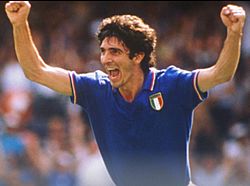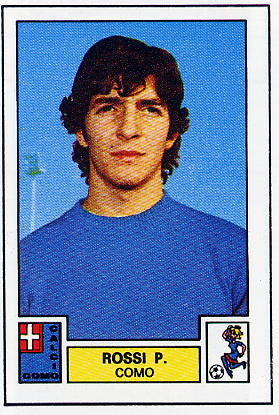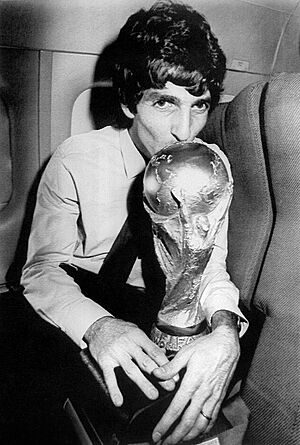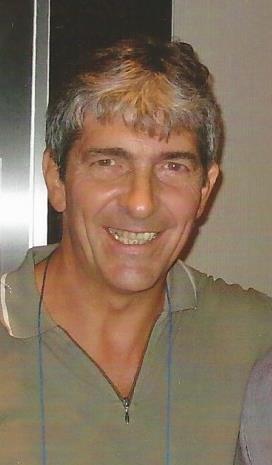Paolo Rossi facts for kids

Rossi at the 1982 FIFA World Cup
|
|||||||||||||
| Personal information | |||||||||||||
|---|---|---|---|---|---|---|---|---|---|---|---|---|---|
| Date of birth | 23 September 1956 | ||||||||||||
| Place of birth | Prato, Italy | ||||||||||||
| Date of death | 9 December 2020 (aged 64) | ||||||||||||
| Place of death | Siena, Italy | ||||||||||||
| Height | 1.74 m (5 ft 9 in) | ||||||||||||
| Position(s) | Striker | ||||||||||||
| Youth career | |||||||||||||
| 1961–1967 | Santa Lucia | ||||||||||||
| 1967–1968 | Ambrosiana | ||||||||||||
| 1968–1972 | Cattolica Virtus | ||||||||||||
| 1972–1975 | Juventus | ||||||||||||
| Senior career* | |||||||||||||
| Years | Team | Apps | (Gls) | ||||||||||
| 1973–1976 | Juventus | 0 | (0) | ||||||||||
| 1975–1976 | → Como (loan) | 6 | (0) | ||||||||||
| 1976–1980 | Vicenza | 94 | (60) | ||||||||||
| 1979–1980 | → Perugia (loan) | 28 | (13) | ||||||||||
| 1981–1985 | Juventus | 83 | (24) | ||||||||||
| 1985–1986 | Milan | 20 | (2) | ||||||||||
| 1986–1987 | Hellas Verona | 20 | (4) | ||||||||||
| Total | 251 | (103) | |||||||||||
| International career | |||||||||||||
| 1977–1986 | Italy | 48 | (20) | ||||||||||
|
Medal record
|
|||||||||||||
| *Club domestic league appearances and goals | |||||||||||||
Paolo Rossi (born 23 September 1956 – died 9 December 2020) was a famous Italian footballer. He played as a forward, scoring many goals. He is best known for leading Italy to victory in the 1982 FIFA World Cup.
During that World Cup, he scored six goals. This earned him the World Cup Golden Boot as the top scorer. He also won the Golden Ball as the best player. Rossi is one of only three players ever to win all three awards at a World Cup. The others are Garrincha (1962) and Mario Kempes (1978).
In 1982, Rossi also won the 1982 Ballon d'Or as the best European footballer. He is the only player to win these four major awards in one year. Along with Roberto Baggio and Christian Vieri, he is one of Italy's top World Cup goal scorers, with nine goals in total.
At the club level, Rossi was a great scorer for Vicenza. He later joined Juventus. With Juventus, he won two Serie A titles, the Coppa Italia, the UEFA Cup Winners' Cup, the UEFA Super Cup, and the European Cup. Rossi is one of only nine players to win the FIFA World Cup, the UEFA Champions League, and the Ballon d'Or.
Many people consider Rossi one of Italy's greatest footballers. In 2004, Pelé named him one of the Top 125 greatest living footballers. After retiring, he worked as a football expert for TV. He passed away on 9 December 2020.
Contents
Paolo Rossi's Amazing Football Journey
Early Days and Rise to Fame
Paolo Rossi was born in Prato, Tuscany, Italy. He started his professional football career with Juventus in 1973. In his early years, he often had injuries. He only played a few games for Juventus between 1972 and 1975.
After several knee operations, he went to Como to gain experience. He made his Serie A debut in the 1975–76 season. He played as a right winger at first. He played six games for Como but did not score.
Becoming a Star Striker
His career changed when Vicenza Calcio took him on loan. His coach, Giovan Battista Fabbri, moved him to the centre of the attack. Rossi quickly showed he was great at finding space and scoring goals. He won the Serie B Golden Boot (top scorer) with 21 goals in his first year in this new role.
In the 1976–77 season, Rossi's scoring helped Vicenza get promoted to Serie A. The next season, he scored 24 goals. This made him the first player to be the top scorer in both Serie B and Serie A in back-to-back seasons. Vicenza finished an amazing second in Serie A that year.

Because of his great performances, Italy's national team manager, Enzo Bearzot, picked him for the 1978 FIFA World Cup. Rossi made his debut for Italy on 21 December 1977. He became famous worldwide as one of the best strikers. He scored three goals and made four assists in the 1978 World Cup. Italy finished fourth. He was named to the tournament's best team.
The 1982 World Cup Hero
After some time away from the game, Rossi rejoined Juventus in 1981. He returned to play just in time for the end of the 1981–82 Serie A season. He helped Juventus win the league title that year. He was also chosen for the 1982 FIFA World Cup in Spain.
At first, Italian fans and journalists thought he was not playing well. This seemed true in Italy's first three group matches. But Italy's manager, Enzo Bearzot, kept Rossi in the team.
Rossi's Incredible Comeback
In the second round, Italy faced tough teams like Argentina (the champions) and Brazil (the favorites). Italy beat Argentina 2-1. Then, Rossi scored an amazing hat-trick (three goals) to help Italy beat Brazil 3-2. This win sent Italy to the semi-finals.
In the semi-final against Poland, Rossi scored two more goals. This won the match for Italy and sent them to the 1982 World Cup final. In the final against West Germany, Rossi scored Italy's first goal. Italy won the match 3-1, winning their third World Cup title!

With six goals in total, Rossi won the Golden Boot as the top scorer. He also won the Golden Ball Award for the best player. He was named to the tournament's best team for the second time. Italian fans called him "Man of the match" and "Pablito." His amazing performance earned him the European Footballer of the Year and World Player of the Year awards in 1982.
Rossi became a national hero in Italy. His goals helped lift the spirits of the entire country.
Later Career and Retirement
After the 1982 World Cup, Rossi continued to play for Juventus. In the 1982–83 season, Juventus finished second in Serie A. But Rossi helped them win the 1983 Coppa Italia, scoring five goals. He also helped Juventus reach the 1983 European Cup final, where they lost to Hamburg. He was the top scorer in that tournament with six goals.
In the 1983–84 season, Rossi won his second Scudetto (league title) with Juventus. He scored 13 goals. He also helped the club win the 1983–84 UEFA Cup Winners' Cup and the 1984 UEFA Super Cup. In his last season with Juventus, Rossi finally won the European Cup in 1985.
After Juventus, Rossi played for Milan for one season in 1985. He scored two goals against Internazionale in a famous Milan derby match. Rossi was also part of Italy's squad for the 1986 FIFA World Cup in Mexico. However, he did not play due to an injury.
He ended his club career at Hellas Verona in the 1986–87 season. He helped them finish fourth in Serie A before retiring. He scored 20 goals in 48 games for Italy. He is Italy's joint all-time top scorer in the FIFA World Cup, with nine goals.
Pelé named Rossi one of the top 125 greatest living footballers in 2004. Rossi later worked as a football expert for TV channels like Sky and Rai Sport. He passed away on 9 December 2020, at the age of 64, from lung cancer. He is remembered as a true legend of Italian football.
How Paolo Rossi Played
Paolo Rossi is known as one of Italy's greatest and most successful forwards. He wasn't a big, strong player, but he was quick, agile, and very good at scoring. He had great technique, balance, and fast reactions. He could shoot accurately and had a special talent for knowing where to be in the penalty box.
He was great at anticipating defenders and getting to the ball first. Even though he wasn't tall, he was good at heading the ball. Rossi made up for his lack of physical strength with his smart play and sharp finishing skills. He could score with both feet and his head.
Rossi started his career as a right winger. Later, especially at Juventus, he also played as a supporting forward. In this role, he would hold up the ball or move defenders out of position. This created space for his teammates to run and score.
Career Stats
Club Appearances and Goals
| Club | Season | League | Coppa Italia | Europe | Other | Total | ||||||
|---|---|---|---|---|---|---|---|---|---|---|---|---|
| Division | Apps | Goals | Apps | Goals | Apps | Goals | Apps | Goals | Apps | Goals | ||
| Juventus | 1973–74 | Serie A | 0 | 0 | 1 | 0 | 0 | 0 | – | 1 | 0 | |
| 1974–75 | Serie A | 0 | 0 | 2 | 0 | 0 | 0 | – | 2 | 0 | ||
| Total | 0 | 0 | 3 | 0 | 0 | 0 | – | 3 | 0 | |||
| Como | 1975–76 | Serie A | 6 | 0 | 0 | 0 | – | – | 6 | 0 | ||
| Lanerossi Vicenza | 1976–77 | Serie B | 36 | 21 | 6 | 2 | – | – | 42 | 23 | ||
| 1977–78 | Serie A | 30 | 24 | 4 | 2 | – | – | 34 | 26 | |||
| 1978–79 | Serie A | 28 | 15 | 3 | 2 | 1 | 0 | – | 32 | 17 | ||
| Total | 94 | 60 | 13 | 6 | 1 | 0 | – | 108 | 66 | |||
| Perugia | 1979–80 | Serie A | 28 | 13 | 4 | 0 | 4 | 1 | – | 36 | 14 | |
| 1980–81 | Serie A | 0 | 0 | 0 | 0 | – | – | 0 | 0 | |||
| Total | 28 | 13 | 4 | 0 | 4 | 1 | – | 36 | 14 | |||
| Juventus | 1981–82 | Serie A | 3 | 1 | 0 | 0 | 0 | 0 | – | 3 | 1 | |
| 1982–83 | Serie A | 23 | 7 | 11 | 5 | 9 | 6 | – | 43 | 18 | ||
| 1983–84 | Serie A | 30 | 13 | 7 | 0 | 9 | 2 | – | 46 | 15 | ||
| 1984–85 | Serie A | 27 | 3 | 6 | 2 | 9 | 5 | 1 | 0 | 43 | 10 | |
| Total | 83 | 24 | 24 | 7 | 27 | 13 | 1 | 0 | 135 | 44 | ||
| Milan | 1985–86 | Serie A | 20 | 2 | 3 | 1 | 3 | 0 | – | 26 | 3 | |
| Hellas Verona | 1986–87 | Serie A | 20 | 4 | 7 | 3 | – | – | 27 | 7 | ||
| Career total | 251 | 103 | 54 | 17 | 35 | 14 | 1 | 0 | 341 | 134 | ||
International Appearances and Goals
| National team | Year | Apps | Goals |
|---|---|---|---|
| Italy | 1977 | 1 | 0 |
| 1978 | 10 | 4 | |
| 1979 | 5 | 3 | |
| 1980 | 3 | 0 | |
| 1981 | 0 | 0 | |
| 1982 | 11 | 6 | |
| 1983 | 7 | 2 | |
| 1984 | 6 | 3 | |
| 1985 | 3 | 2 | |
| 1986 | 2 | 0 | |
| Total | 48 | 20 | |
- Scores and results list Italy's goal tally first, score column indicates score after each Rossi goal.
| No. | Date | Venue | Opponent | Score | Result | Competition |
|---|---|---|---|---|---|---|
| 1 | 2 June 1978 | Estadio Mundialista, Mar del Plata | 1–1 | 2–1 | 1978 FIFA World Cup | |
| 2 | 6 June 1978 | Estadio Mundialista, Mar del Plata | 1–0 | 3–1 | 1978 FIFA World Cup | |
| 3 | 18 June 1978 | Estadio Monumental, Buenos Aires | 1–0 | 1–0 | 1978 FIFA World Cup | |
| 4 | 21 December 1978 | Stadio Olimpico, Rome | 1–0 | 1–0 | Friendly | |
| 5 | 24 February 1979 | San Siro, Milan | 2–0 | 3–0 | Friendly | |
| 6 | 26 May 1979 | Stadio Olimpico, Rome | 2–1 | 2–2 | Friendly | |
| 7 | 13 June 1979 | Stadion Maksimir, Zagreb | 1–0 | 1–4 | Friendly | |
| 8 | 5 July 1982 | Estadio Sarriá, Barcelona | 1–0 | 3–2 | 1982 FIFA World Cup | |
| 9 | 2–1 | |||||
| 10 | 3–2 | |||||
| 11 | 8 July 1982 | Camp Nou, Barcelona | 1–0 | 2–0 | 1982 FIFA World Cup | |
| 12 | 2–0 | |||||
| 13 | 11 July 1982 | Estadio Santiago Bernabéu, Madrid | 1–0 | 3–1 | 1982 FIFA World Cup | |
| 14 | 5 October 1983 | Stadio della Vittoria, Bari | 3–0 | 3–0 | Friendly | |
| 15 | 22 December 1983 | Stadio Renato Curi, Perugia | 3–1 | 3–1 | UEFA Euro 1984 qualifier | |
| 16 | 4 February 1984 | Stadio Olimpico, Rome | 2–0 | 5–0 | Friendly | |
| 17 | 3–0 | |||||
| 18 | 4–0 | |||||
| 19 | 5 February 1985 | Dalymount Park, Dublin | 1–0 | 2–1 | Friendly | |
| 20 | 3 April 1985 | Stadio Cino e Lillo Del Duca, Ascoli Piceno | 2–0 | 2–0 | Friendly |
Awards and Trophies
Vicenza
- Serie B: 1976–77
Juventus
- Serie A: 1981–82, 1983–84
- Coppa Italia: 1982–83
- European Cup: 1984–85; runner-up: 1982–83
- European Cup Winners' Cup: 1983–84
- UEFA Super Cup: 1984
Italy
Individual
- Serie A top scorer: 1977–78 (24 goals)
- Serie B top scorer: 1976–77 (21 goals)
- FIFA World Cup Silver Ball: 1978
- FIFA World Cup All-Star Team: 1978, 1982
- Gazzetta Sports Awards Man of the Year: 1978
- FIFA XI: 1979, 1986
- FIFA World Cup Golden Boot: 1982
- FIFA World Cup Golden Ball: 1982
- Onze d'Or: 1982
- Ballon d'Or: 1982
- World Soccer Awards Player of the Year: 1982
- L'Équipe Champion of Champions: 1982
- Guerin Sportivo Player of the Year: 1982
- Guerin Sportivo All-Star Team: 1982
- European Cup Top Scorers: 1982–83
- World Soccer Awards 100 Greatest Players of the 20th Century #42
- FIFA 100
- UEFA Golden Jubilee Poll: #12
- Golden Foot "Football Legends": 2007
- Italian Football Hall of Fame: 2016
See also
 In Spanish: Paolo Rossi para niños
In Spanish: Paolo Rossi para niños
 | Valerie Thomas |
 | Frederick McKinley Jones |
 | George Edward Alcorn Jr. |
 | Thomas Mensah |


